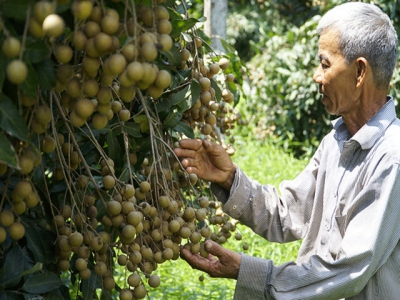Mekong Delta fruit overabundant amid HCMC wholesale market closures

Fruit from the Mekong Delta, Vietnam's agriculture hub, is selling poorly at lower prices as wholesales markets across HCMC close due to Covid-19.
Longan orchards in Chau Thanh District, Dong Thap Province are ready for harvest. Photo by VnExpress/Ngoc Tai.
Nguyen Van Thuan, owner of a big longan orchard in Chau Thanh District, Dong Thap Province, said his longans are ripe, but no traders have come to buy them. Prices have fallen by over 50 percent against the pre-pandemic period to VND10,000-15,000 ($0.44-0.65) a kilogram.
"I need to sell over 20 tons of longan now. This neighborhood needs to sell hundreds of tons from now to the end of this month, but no traders have come here," Thuan lamented.
Like the longans, over 1,200 tons of purple sweet potatoes grown in Hoa Tan Commune, Chau Thanh District are waiting to be sold.
Nguyen Van Duyen, chairman of Hoa Tan People's Committee, said purple sweet potatoes sold from the field go for only VND5,000-6,000 per kilogram, but that on certain days, no transaction occurs. "Farmers don’t know what to do. If this situation continues, they will surely have to throw their potatoes away," he said.
Fruit trader Tran Van Nam said before the three main wholesales markets of Hoc Mon, Binh Dien and Thu Duc in Ho Chi Minh City closed down, he had bought over 50 tons of fruit in Can Tho City each day to sell. "Now I have to stop since there are no outlets," he commented.
Before the three markets shut, some 30 truck companies made 60-80 journeys each day to transport fruit and vegetables to the markets. Now, few trucks are running, transporting smaller volumes of goods to smaller markets in HCMC.
Truck driver Vo Thien Thanh said it was time consuming to transport goods from Dong Thap to the city now because of too many quarantine checkpoints along the route.
Song Hau (Hau River) Farm in Can Tho's Co Do district cultivates 1,500 hectares of mangoes and 400 hectares of longans, with its key market in HCMC. Ngo Si Tien, head of the farm’s business department, said the price for Hoa Loc mangoes have dropped to below VND10,000 per kilogram from the previous VND25,000-30,000, but no traders have shown up to buy.
Sales of vegetables from the central highlands town of Da Lat have also been hard hit by the temporary closure of wholesales markets in HCMC.
Thao Nguyen of Da Lat’s District 11, who used to supply vegetables to the wholesales markets, said these days she has had to sell them via social networks with much smaller sales. "Sales have fallen 70-80 percent, but something’s better than nothing," she noted.
Owners of some veggie gardens in Da Lat have called on charity groups and volunteers to harvest their vegetables for free distribution in HCMC.
Now, some 30 percent of vegetables-growing areas in Da Lat are used to cultivate veggies perfunctorily, with the remainder left vacant. "We don’t want, but are forced to let land rest," Dung, owner of a two-hectare lettuce farm, said.
According to the Lam Dong Department of Industry and Trade, an important solution to the sluggish sales of fruit and veggies is distributing them on e-commerce platforms.
Có thể bạn quan tâm
 Rice exporters advised to prefer quality to quantity
Rice exporters advised to prefer quality to quantity Rice traders and exporters should establish links with farmers to ensure supply meets market demand and efficiency
 Vietnam to build upscale coffee brand
Vietnam to build upscale coffee brand Việt Nam has set up a project to promote high-quality Vietnamese coffee backed by about VNĐ170 billion (US$7.5 million)
 Ukraine's animal feeding stuff approved to export to China
Ukraine's animal feeding stuff approved to export to China Sunflower meals and sugar beet pulp are widely used as valuable feed for farm animals, especially for beef cattle and chicken.
 EU: New rules on organic production from January 1, 2021
EU: New rules on organic production from January 1, 2021 Organic is no longer a niche part of the EU agri-food sector as it was when the current rules were first drawn up
 Harvest analysis indicates high levels of mycotoxins in U.S. corn silage
Harvest analysis indicates high levels of mycotoxins in U.S. corn silage In 2016, corn growers faced challenges from mycotoxins, and those challenges seem likely to crop up again with this fall's harvest